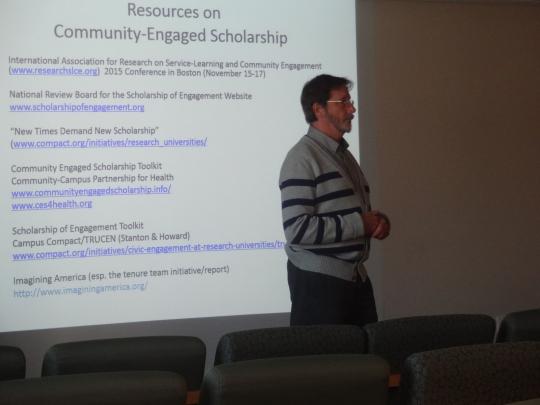Exploring Publication of Service-Learning and Community Engaged Scholarship
We were honored to host Jeffrey Howard, editor of the Michigan Journal of Community Service Learning, to provide the Getting Service-Learning Research and Community-Engaged Scholarship Published faculty workshop. Workshop participants completed an exercise in which they played the role of reviewers determining if a sample article was appropriate for publication in the Michigan Journal. They used and applied Glassick et al.'s Six Scholarship Assessment Criteria, which examines whether a scholarly paper has a clear goal, adequate preparation, appropriate methods, significant results, reflective critique, and effective presentation.
Through this exercise, faculty explored how they could expect their future submissions to be received.
"Attending this workshop has renewed my enthusiasm to broaden engagement. It was a reintroduction to literature on how to describe what students get out of community engaged service-learning and on what types of work can be publishable work. The workshop also made me realize how many resources [publishers, magazines, etc.] were available," explains Suzanne DeCoursey.
This intimate workshop provided plenty of helpful information, definitions, and assessment criteria for community-engaged scholarship papers. Howard explained that the goal of the Journal is to serve as a big tent approach to the types of scholarly papers that qualify as "community engaged scholarship." To do this, one must first be able to understand the definitions of both "community engagement" and "scholarship."
Community engagement is the description of the "collaboration between higher education institutions and their larger communities for the mutually beneficial exchange of knowledge and resources in a context of partnership and reciprocity." According to Howard, scholarship is the "creating and transmitting of new knowledge to others" and can be broken down into four conceptualizations as defined by Ernest Boyer's "Four Scholarship Conceptualizations": discovery; integration; application; and teaching.
- Discovery -- must contribute to the advancement of knowledge
- Integration --must be connections between multiple disciplines
- Application -- the knowledge must be applied to resolve multiple issues
- Teaching -- educates future scholars while stimulating active learning
Papers submitted to any scholarly journal should explore community engagement using at least one of the four scholarship conceptualizations. The CCE has the entire collection of Michigan Journal of Community Service Learning available for faculty review. To explore publication of your community engaged scholarship or service-learning research, please contact us.

Author: Cera Murata



